|  
COVER STORY | CALENDAR
March 13, 2003
Show of force:
Faced with a roomful of loggers,
Supervisors nix DA's bid for outside help in PL suit story and photos by ANDREW EDWARDS SPRAWLED ON A LEATHER COUCH, DISTRICT Attorney Paul Gallegos admitted to being "just a little tired." Papers lay stacked in piles on every available surface around him. He was in the office of Assistant District Attorney Tim Stoen, who seemed undeterred. "The truth is a hammer," Stoen said. "We have a hammer. We're going to win this case." "I have strong convictions that we did the right thing and, if anything, that was strengthened today," Stoen added, after a marathon session of the Humboldt County Board of Supervisors on Tuesday. Brave words after a meeting that couldn't have been much worse. After hearing testimony from citizens ranging from a geologist to an Indian chief, from a Pacific Lumber Co. lawyer to a logger's wife, the Supervisors voted against allowing Gallegos to hire a Bay Area law firm to assist him in his controversial lawsuit against PL. The firm, Cotchett, Pitre, Simon and McCarthy, specializes in corporate fraud, and Gallegos is charging PL with exactly that, fraud to the tune of $250 million, deceiving state logging regulators, with false data. The only supervisor who didn't vote against Gallegos was John Woolley, who said he wanted more time to consider the case.
 Logging trucks parked outside the Humboldt County courthouse Logging trucks parked outside the Humboldt County courthouse
Before the meeting started the street outside the courthouse was lined on both sides by the logging trucks of Steve Wills, a PL contractor who spoke at the meeting. On the steps of the courthouse milled a crowd of men, many in loggers' traditional baseball caps, thick suspenders and Ben Davis shirts. They stood in groups, talking and watching passers-by. Inside the chambers the room was packed. People mobbed around the doors trying to hear. Early on loudspeakers in the lobby were turned on so people not in the room could follow the proceedings. The tension mounted as the Supervisors plodded through their opening business (like declaring March Jazz Festival Appreciation month). They all knew what the crowd was there to see. Finally, Gallegos and Stoen came and sat at a table before the board. Stoen was doing most of the talking. He said he was there to request that the Supervisors allow the district attorney to hire the Cotchett firm, based in Burlingame. Under the terms of agreement the firm, Stoen explained, would receive 14.5 percent of any money recovered from the lawsuit, covering all their own personnel costs and taking a loss if the case failed. Responding to a question at one point, Gallegos inadvertently referred to a supervisor as "your honor." Laughter. Then the main event kicked off. When Board Chairman Jimmy Smith asked if there were comments a line formed immediately stretching from the front of the room out the back door. Though different perspectives were represented, many of the statements were confusing and emotional, decrying Gallegos for suing a company as philanthropic and economically important as PL. A sampling of the first several speakers: Larry Kramer, geologist from Fortuna. If this lawsuit goes through what we will really be doing is shooting ourselves in the foot. We'll be pushing out the middle class.
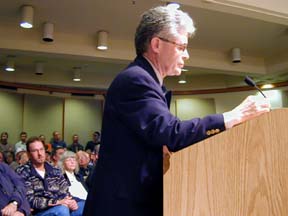 Assistant District Attorney Tim Stoen addresses the Supervisors. Assistant District Attorney Tim Stoen addresses the Supervisors.
Larry Olsen, area resident since 1959. It's time for the Board of Supervisors to stand up. Are we going to lose our largest employer in Humboldt County because our DA chooses to sue. For what? For something that isn't really in his jurisdiction. I believe here the state Department of Forestry should be taking up this angle, not our District Attorney. Nadananda, Friends of the Eel River. Workers are here in mass today because they are concerned about their jobs and their future as well they should be. But irregardless of whether they continue to be employed by this company or another it is not their employment that is before you but the kinds of business practices that are tolerated in Humboldt County. Jim Branham, PL's director of communications. We're convinced that it's a complaint without merit, without any real factual basis. It fundamentally misunderstands what has taken place with the Headwaters agreement and what is happening out there on the landscape. It's affecting people's lives already. That's why these people are here; they'd rather be doing something else today. Throughout, Supervisor Smith, in a baby blue dress shirt, admonished the crowd to address the board not the D.A. and to stick to whether or not outside counsel should be hired; but most speakers strayed far afield, from attacking the case itself to extolling the virtues and history of the logging company. More than one of the speakers said they had been born in the company hospital in Scotia before it shut down. Many people cautioned the board against hiring outside help, as they saw it as a waste of tax money, despite the fact that it had already been made clear that the firm would be paid from any civil penalties a judge awards. Others predicted dire consequences if the suit succeeded. "I really think if there's no more people and a whole lot of trees what good is that?" asked Rod Sanderson, a self-described community leader and part-time pastor for Rio Dell. Some mentioned the $5,000 that Robin Arkley Sr., of Arcata has offered to anyone who wants to begin a recall campaign against Gallegos. Others defended Gallegos and the suit. Longtime PL critic Ken Miller called the case "very factual and very simple" and questioned why the board wouldn't back up a district attorney that had been elected by the people. "It's inconceivable that you wouldn't allow the district attorney to have the best legal counsel available," Miller added. "Joe Cotchett is no ambulance chaser."
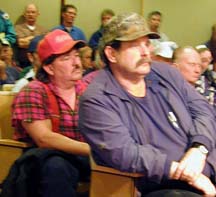 Loggers listen to the proceedings in the Board of Supervisors chambers. Loggers listen to the proceedings in the Board of Supervisors chambers.
After three hours, the stream of speakers slowed to a trickle, most of the woodsmen had filtered out and finally, Chairman Smith declared a 10 minute break. The gruff Roger Rodoni, brandishing a four-page letter from the Fair Political Practices Commission stating that he doesn't have a conflict of interest when it comes to PL (he leases ranch land from them), started off the debate. He questioned Cotchett's reasons for wanting to get involved, suggesting he wanted a park named after him. He immediately motioned for the DA's request to be denied. Bonnie Neely quickly seconded. Fifth District Supervisor Jill Geist seemed confused about the parliamentary procedure involved, and wanted to make sure that if another request for outside counsel was made that it would be heard. Woolley wanted more time. They all questioned why the DA had laid his case out to the local Bar Association in a luncheon last weekend, without making their case to the Supervisors first. Neely quoted a letter submitted the day before from the California Department of Fish and Game's lead attorney, which said the case contained factual errors. Smith said he'd looked into it, and it looked as if the DA's office was standing alone in defending the facts of the case, while every other agency was lined up on the other side. Stoen fielded questions, somewhat impatiently, later complaining that the Supervisors failed to ask him the only two relevant questions: Did PL give false information for inclusion in the final Environmental Impact Report? And when they got the corrected information did they send it to the director of CDF so he could recirculate it? The meaning of the vote was stark: the DA's office is alone in its prosecution, something Gallegos characterized as unfair; after all, he said, PL's is almost definitely going to hire a San Francisco law firm to help them with the case. Stoen said they'd been prepared to act alone from the beginning, and the level of resistance they saw Tuesday was a measure of just how seriously PL takes this case. "I think Palco knows in its heart of hearts that they have a fight on their hands," Stoen said.
HUMBOLDT PEOPLE A dying breed: Eureka is down to two cobblers by GEORGE RINGWALD 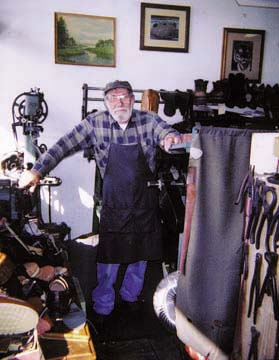 BRUNO RAVELLI HAS BEEN MY COBBLER, or shoe repairman, for countless years now, but what never ceases to amaze me is the casual clutter of leather shoes and boots stacked seemingly haphazardly around his Eureka shop at 312 West Harris St. On a recent visit, I asked: "Why do you have those shoes all over the place?" BRUNO RAVELLI HAS BEEN MY COBBLER, or shoe repairman, for countless years now, but what never ceases to amaze me is the casual clutter of leather shoes and boots stacked seemingly haphazardly around his Eureka shop at 312 West Harris St. On a recent visit, I asked: "Why do you have those shoes all over the place?"
"I don't know -- something to look at, I guess," he says, with a wide grin. "There's a few here that don't belong to anybody. Like these old ones here" -- holding up a pair of once-fashionable ladies boots. "I found them up in my mother's attic. But these are customers', customers', customers'," he goes on, pointing out various modern leather shoes or boots. "Well, yeah, that's my business; you've gotta have shoes. Five pair ready for next week. These are all done. Whatever. It pays the rent; that's the main thing." Ravelli, now 71, has a gnarled look about him; you can see it especially in the hands that have worked a lot of leather over the years. He was wearing his usual working garb: flannel shirt, jeans, with sturdy black apron and a small baseball cap on his head. He has a short, scraggly grayish beard, which he says he's "about ready to cut it off and start over again." He talks in a gravelly voice, and he frequently punctuates sentences with a hearty laugh. Bruno learned the trade when he was 8 or 9 from his father, Antonio (Tony) Ravelli, who emigrated here from Italy, resuming his shoe repair trade in Eureka, downtown on Fifth Street. "You know, the old-timers, they'd start you out when you're this high," Bruno said, holding his hand about belt level. "I had a block of wood to stand on so I could reach the machinery." Even though he worked in his father's shop, Bruno managed to go through high school in Eureka. "We had our 50th reunion recently," he relates, "and that was the first one I went to." He didn't remember how big his class was. He adds, "I know 49 of them had passed away." Before opening his Harris Street shop in 1977, Ravelli worked in the San Francisco Bay area for 17 years. "And I was still connected with the leather and shoe repair business," he relates, "because I worked with what they called a `shoe binding place.' That's where they sell all the stuff to the shoe repair shops. I did that for five years, and I knew shoe repairmen all over -- shops in Oakland, Berkeley, Walnut Creek. I didn't know it at the time, but I knew a lot of things that these guys in The City didn't. My name was good and shoe repairmen were calling me from all over. "I worked in San Francisco in the Marina area for an Italian guy, who had a good business going -- Frank's Shoe Service -- and he'd watch me work, and he'd say, `Who showed you how to do that?' And finally I said, `Look, Frank, if you're happy with my work, I'll come back tomorrow; if you're not happy, I won't show up.' `Oh, no, no, no, you gotta come back.' And then it got to the point where he was asking me, `Bruno, you think it's okay to do it this way?'" Bruno cracks up. "It was kind of comical, because he'd been in the business a long time too, you know." Those days were golden for shoe repairmen. It was a time when leather shoes were de rigueur for would-be fashion plates. Today, however, the market is flooded with ersatz shoe materials, and of course the turn away from leather shoes has had its impact on the old-time cobblers. In Eureka, for instance, there are now just two, the 71-year-old Ravelli and the 56-year-old Mike Grundman, whose shop is at 3127 F St., on the fringe of Henderson Center. Like Ravelli, Grundman started out in the business when he was 8 years old, learning from his father as Bruno did from his.
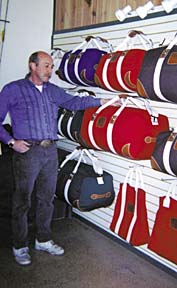 Mike Grundman shows the canvas bags he makes and sells in his Henderson Center shop. Mike Grundman shows the canvas bags he makes and sells in his Henderson Center shop.
"We've been here probably 48 years now," says Grundman. "It's almost like a landmark, you know."
The two are friendly competitors, one gathers. "Oh yeah," Ravelli says. "I go up and visit with him, and sometimes if I can't handle a job here, I tell them to go up there (to Grundman's). If they don't agree with me, on price or whatever, I tell 'em to go up there and get a second opinion." Ravelli is reminded of when he bought the shop of a cobbler in Rheem Valley, in the Bay Area. "I didn't look at his books," he says. "A lot of guys, you know, want to see how much money you made, and yada, yada, yada. I had enough confidence in myself. If a person has enough enthusiasm or whatever you want to call it, you can make it, you know. I think it's up to the individual." But admittedly, these are hard times for leather shoe repairmen. "It's a dying trade," says Grundman. "We're too much of a throwaway society." "Well, sure it is," agrees Ravelli. "I've seen it die over the last 25 years. When I opened this shop in '77, there were five shops in Eureka, and only a couple left now. And when I'm gone, and when Grundman goes, that's gone, too. [Below left: Bruno behind the counter of his Rheen shop, 1977] 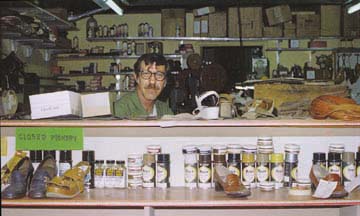 "It's definitely a dying business," Ravelli adds. "It's almost like the blacksmith. You know, where do you find one of those?" "It's definitely a dying business," Ravelli adds. "It's almost like the blacksmith. You know, where do you find one of those?"
Grundman says, "Oh, years and years ago -- probably in the late '30s, early '40s -- there used to be 22 shoe repair shops here in Eureka. Everybody had their shoes repaired then, you know. You just didn't go out and buy a new pair of shoes, with the economy back then. And they were pretty good leather shoes then, too. "Nowadays, it's been Bruno and I," he added. "But it just kind of stagnated right there; I mean, the volume of business isn't what it was 10 years ago." As a sideline, Grundman has started making and selling canvas duffel bags. But the main business still is shoe repair. Grundman notes: "People that are buying good shoes, it still definitely pays to repair them." What's more, showing that he's a with-it guy in this modern high-tech age, Grundman says that he's "working on a website now to get this stuff on the Internet." Ravelli too has other angles to work. "You know, you get a little bit of everything here," he says. "I get purses and I get luggage and I get wallets to sew or holsters to sew. You get all that kind of leather work. It all blends in. "I used to be heavy into dyeing shoes for a shoe store called Annie's Shoes," he goes on, "and I used to do all her dye work on fabric shoes. They were for matching gowns -- like weddings, proms and graduations. There were times I did about 120 pair a month. Then I quit doing it because it got to be too much. I was doing most of it in the evenings, because you can't dye any shoes while your customers come in. You can't stop once you start on a fabric shoe, you gotta dye the whole thing quick. "It can get to you. There's times that I used that whole piece of material before I got the color that I wanted. It's pretty tricky. Then if you add too much of one thing, sometimes you have to pour the whole thing out and start all over again." Just the thought of it sends him into an outburst of laughter. The Ravelli shop is open only three days a week now, Wednesday through Friday, 9 a.m. to 4 p.m., or make that five minutes to 4. "I leave five minutes to 4, to make sure I get out of here in time," he adds the usual laugh. A laid-back kind of businessman. "I used to be open five days a week, and I'd stay here 'til 6 or 7 at night," he recalls. No more. "I got my apprenticeship in a long time ago."
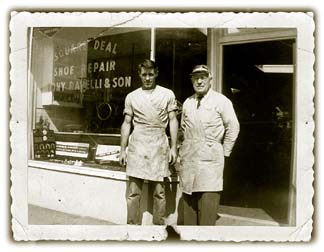 Bruno Ravelli with his father, Antonio, in front of their Fifth Street shop, Square Deal Shoe Repair. Bruno Ravelli with his father, Antonio, in front of their Fifth Street shop, Square Deal Shoe Repair.
It was two or three years ago that he decided to shorten his work week. "I think it was a long holiday one weekend or something, and I liked it so well that I just kept doing it." A customer came in to pick up his shoes, and after he left, Ravelli told me: "You know, that guy, he's a mailman. So he wears his heels out. So what I do is put a new section in there for him, not a whole heel. He's been very happy with it." Bruno shows me the sole he put on the shoes, a kind of rubber. "It wears like crazy." Reminds me of the time he put a new kind of sole on my shoes. When I asked him what the material was, he quipped. "I don't know. Could be leftover lasagna, for all I know." It's hard to think of that shop without the affable Bruno Ravelli behind the counter, but he confides that he is thinking of retiring. In fact, he's dickering with a shoe repair guy from over in Paradise, the other side of Chico, as they say, who wants to escape the hot summers there. The deal is "all verbal so far," Ravelli says, and it could fall through. He notes, with some amazement -- or amusement, whatever -- of the prospective buyer: "He's my age! And he wants to go back in the business." And what would Bruno Ravelli do if he were to retire? He pauses a moment, then says, with a laugh, "Sleep a lot." "No," he adds getting serious. "I have hobbies. I've got a '67 Chevelle that I'm restoring." And then there's still the chance that the buyout may fall through and Ravelli may have to postpone that retirement. His answer to that is: "Who cares!? I'll be here anyway." He ends it with a laugh. Longtime Journal contributor George Ringwald lives in Eureka.
Layoffs loom at HSU
Humboldt State University has until March 15 -- this Saturday -- to come up with a plan to deal with an anticipated $8 million cut in its budget for the 2003-04 school year. It is almost certain that the plan will include layoffs. The cut, nearly 10 percent, is the result of Gov. Gray Davis' proposal to cut $326 million out of the budget for the entire California State University system. Davis says a cut of that magnitude is required due to the record $35 billion-plus deficit that the state government is operating under. Last weekend, HSU President Rollin Richmond held a summit with his executive committee trying to nail down just where the money is going to come from. "It's rough; it's rough," said Elizabeth Hans McCrone, director of community relations. McCrone has been asked to cut her department's budget by almost 13 percent. "Everyone's going to have to take a cut." McCrone said that though nothing is finalized -- the state budget still has to go through several more draft forms before it's approved -- if the cut remains at $8 million the results will be devastating. And that means for personnel too. "Only so much of the university is operating expenses and the rest is personnel," McCrone said. She declined to comment on how many lay-offs, if any, might take place. She did say that the last time the university went through such a big budget crunch, in the early `90s, no permanent personnel were laid off and most of the part timers that were, were rehired as soon as the situation improved.
Freshwater showdown Last week, Pacific Lumber Co. contract climber Eric Schatz shimmied up trees all over the Freshwater watershed serving papers on tree-sitters that ordered them to appear in court in two days. They were told to show why Humboldt County Superior Court Judge Dale Reinholtzen shouldn't issue a restraining order barring them from trespassing on PL property. The treesitters appeared as ordered, Reinholtzen was evidently unconvinced. On Monday, he decided that a restraining order was justified for a simple reason: the protesters are likely to be successfully convicted for trespassing. PL has until Friday to deliver the judge's order, either by presenting it directly to activists up in trees, or by nailing the order to trees that are currently being occupied. Once that's done, the activists will have 24 hours to vacate their perches. Remedy, an activist who has spent nearly a year in a tree she calls Jerry on Greenwood Heights Road, said this latest legal development doesn't change anything for her. "I don't plan to come down because of this. I don't know anyone who's planning to do that," she said, speaking by cell phone. "It's a little intimidating, but it's more intimidating to have the salmon go extinct or drink diesel fuel in your water. Really, things seem to be coming to a head." She said that even if climbers come they won't be 100 percent successful. "They never are," she said. Even if they were more activists would go up, she added. She admitted to being worried for her fellow tree-sitters' safety. "I'm really afraid that someone is going to get hurt," she said.
eBay auction updates
Though the eBay auction for the town of Carlotta ended Sunday with one bid at the minimum price of $1.065 million, the existence of an actual buyer is still in question. "They're qualified to buy it, but they're still going to fly up here, and they have to put something in writing" before the deal can go through, Realtor Sandra Spalding said. The buyer is a corporation located in the Los Angeles area, she added. The deal for the sale of Bridgeville was still in escrow as of late last week. It was expected to close, for an amount somewhat less than the high bid of $1.78 million, any day. Meanwhile, the Arcata Theater's eBay listing ended March 7 without attracting a sufficient bid. The highest bid, $225,100, was well below the reserve amount, set between $455,000 and $485,000.
PL not the root of the problem A California Department of Forestry investigation has concluded that three redwoods in Humboldt Redwoods State Park which fell when their roots were undercut by turbulent runoff in December were not helped along by recent Pacific Lumber Co. logging. "There is no evidence that harvesting conducted within the past three years has adversely impacted the lower part of the channel at the Quigley Grove site," the report said. Environmentalists had claimed that logging upstream was to blame -- and, according to the report, that may be the case. But only logging that took place prior to the rainy winter of 1996-97. According to CDF, stricter logging rules since then do not allow the sorts of logging practices that were associated with earlier landsliding. That has been challenged by the Humboldt County District Attorney's Office, which has charged PL with hiding scientific data prior to the signing of the 1999 Headwaters agreement. The information could have led to a curtailment of logging on its timberlands once the agreement took effect.
Interim director named Debbie Goodwin, the former executive director of the Humboldt Arts Council, has been named interim director of advancement for Humboldt State, the university's top fund-raising position. For the past year Goodwin has served as a senior advancement officer. She replaces Maggie Hardy who recently resigned to accept a position with the California Coast Foundation. As part of an administrative restructuring, the directors of university advancement, community relations, and diversity and compliance will all report directly to HSU President Rollin Richmond. Previously those functions were under the vice president for development and administrative services. That position is being split. The search for a vice president for development is being put on hold due to the state's budget crisis, a university spokesperson confirmed Tuesday. However, the search for provost/vice president for academic affairs is in progress. Plans are also in the works for Richmond's inaugural reception May 2, according to the university's website.
Art deco award Bob Rickard, general manager of the Eureka Theater, received a preservation award from the Art Deco Society of California during a ceremony last weekend in Oakland. The theater was built in 1938 by George Mann's Redwood Theater Corp. and closed in 1993 for regular film showings. Rickard, a former usher, successfully negotiated with the owners to form a volunteer organization to run the theater for community events. A fund-raising effort is underway to restore and reopen the theater for live performances with an expected seating capacity of 1,200. The Art Deco Society honors persons who have helped preserve and restore buildings and memorabilia from the Art Deco era, which flourished from the 1920s to early 1940s.
Fish kill conference A scientific conference on the last fall's Klamath River fish kill is being held this weekend at Humboldt State University. The keynote speaker is Rep. Mike Thompson, D-Napa, who blames the Bush administration for the fish kill in which 33,000 adult salmon and steelhead perished over a 16-mile stretch of the lower Klamath River in late September. Thompson says that too much water was reserved for farmers in the upper Klamath basin while too little was released downstream. The scientific consensus is that low water flows mandated by the U.S. Bureau of Reclamation led directly to the kill. Speakers include Mike Belchik, a fisheries biologist with the Yurok tribe who will talk about "suitable" flows for salmon; and Scott Foott of the U.S. Fish and Wildlife Service, who will focus on the diseases that killed the fish. The conference, sponsored by the Humboldt chapter of the American Fisheries Society, begins at 9 a.m. in the Kate Buchanan Room. Call 822-9607, ext. 203, for more information.
COVER STORY | CALENDAR Comments? E-mail the Journal 
© Copyright 2003, North Coast Journal, Inc. |